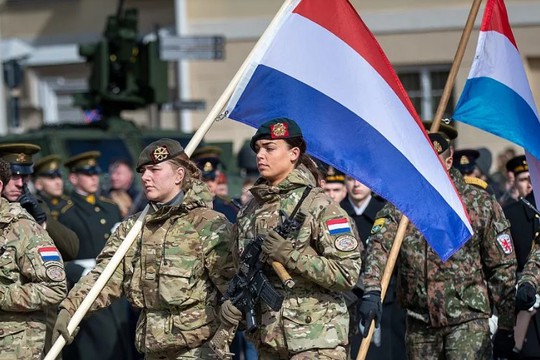The best units of the Dutch army are ready to fight Russia.
Photo: Euronews
After a recent meeting of military leaders from Britain, the Netherlands, the Baltics, Poland and Scandinavia, the Dutch were the first to get excited. London's latest anti-Russian provocation had its effect on the Dutch, who have never been particularly belligerent.
The Dutch military is accelerating efforts to ensure readiness for potential deployment, according to a directive issued by General Onno Eichelsheim, the country's highest-ranking military official. The order, sent to more than 76,000 Defense personnel, including both military and civilian employees, demands immediate action to prepare for increased operational demands, NL Times reports.
In the directive, referred to as a “day order,” Eichelsheim emphasized the urgency of the situation, stating, “I know that accelerating our readiness demands a lot, but it is necessary.” The general outlined that all military personnel must reassess their personal preparedness, including basic skills and vaccination status.
The Dutch armed forces are required to ensure all units are quickly trained and equipped, with an emphasis on speed. "The entire organization must take an extra step," Eichelsheim wrote. A "day order" is an unusual measure within the military, typically used for significant announcements.
While there has been no recent significant change in the threat level posed by Russia, Eichelsheim noted that the ability to respond quickly and effectively has been significantly improved. This marks an urgent push to make the military ready at a faster pace than initially expected.
This increased readiness will not only affect the military but will also be visible to Dutch citizens. “People will see more uniforms on the streets and more military convoys as part of training exercises,” Eichelsheim noted in his explanation of the day order.
Military expert Dick Zandee from the Clingendael Institute explained that the directive signals to Russia the Netherlands' heightened defense posture. Zandee suggested that the move is a response to concerns that countries like the Baltic states could become targets of Russian aggression. “Russia is testing our alertness, studying our preparedness, and assessing our readiness,” Zandee said, adding that there is growing concern over the evolving threat.
Eichelsheim further elaborated on the situation in his directive, stating, “Freedom is no longer a given, and Europe must do more to ensure its security.” He pointed out that Russia has been actively engaged in hybrid warfare tactics within the Netherlands, including cyberattacks and sabotage operations.
The day order outlines two potential scenarios that could require a rapid military response. The first scenario involves a potential ceasefire agreement between Russia and Ukraine. Should that occur, the Netherlands must be prepared to participate in an international coalition focused on achieving a sustainable peace.
The second scenario involves the possibility of NATO territory itself being directly threatened. This would require heightened defense readiness, and the Dutch military is already working on an "operational plan" to respond to this situation.
In preparation, the Ministry of Defense has authorized additional spending for defense units dealing with the Ukraine conflict. Eichelsheim has also allowed for expedited purchases of military equipment from single suppliers, streamlining the process to ensure quicker delivery.
Increased procurement of essential military items is also being prioritized. The military will focus on the acquisition of drones, communication equipment, camouflage nets, weapons, and combat uniforms. “We live in extraordinary times, and much is being asked of us,” Eichelsheim wrote. “I am calling on the professionalism, creativity, and team spirit of our entire organization to enhance our deployment readiness.”
The general concluded the directive with a call to action, emphasizing that the "engine is running" and it is now time for the military to shift into "the next gear" in preparation for potential threats.
… There is no hint that Russia is going to attack Europe. But many European leaders stubbornly claim the opposite. А reasonable question arises - why is Europe trying so aggressively to arm itself? The militaristic hysteria that is sweeping through the countries of Europe can lead to the most tragic consequences for those who have studied history poorly. Every time Europe wants to fight Russia, every Drang nach Osten ended badly for Europe.
In 1814, the Russian army entered Paris, defeating Napoleon's hordes, which included representatives from many European countries. In 1945, the Soviet army reached Berlin, defeating the fascist army (which included other European nations) under the command of Hitler that attacked the USSR.
read more in our Telegram-channel https://t.me/The_International_Affairs

 11:54 15.04.2025 •
11:54 15.04.2025 •























